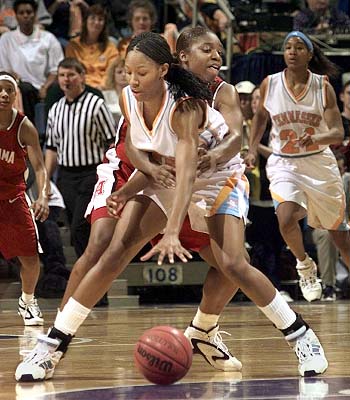Chamique Holdsclaw's college career has been over for more than a week. She has gone from the most prolific player in the history of the college game to the professional game's most promising rookie.
In just a few weeks, Holdsclaw will be the No. 1 pick in the WNBA draft.
The more intriguing question would be, who's going to be No. 2?
The folding of the American Basketball League last winter has changed everything in the women's professional game. It has left 100 players -- ranging from marquee quality to merely talented -- to find a roster spot on one of the 12 remaining WNBA teams.
It remains to be seen how many ABL players will be permitted to seek employment in the WNBA. The league and the newly formed players association are still negotiating the point, and neither side seems ready to give in yet. But one thing is clear: there aren't going to be many spots left for the 1999 senior class of college players.
Conventional wisdom says that perhaps no more than a dozen of this year's senior class will land a spot in the WNBA. Contrast that with last season, the ABL and the WNBA had a total of 52 rookies in their ranks.
What a difference a year will make.
"Timing is everything," said Hall of Famer Ann Meyers. "I can list 10 players this year, if you're lucky, who are going to make an impact at the pro level.
"You're going to have players who are 26-30 years old with eight years of pro experience competing with a college kid who doesn't have a clue."
University of Washington senior Amber Hall is one of those talented seniors who would have had no problem landing a spot on a pro roster last year. This year, it is far from automatic. Very far.
"I think we might be the ones getting the jacked-up deal," said Hall, a two-time All-Pac-10 performer who led the conference in rebounding the past two seasons. "It's definitely going to be a lot tougher to get in."
"Tough might not even be strong enough," said Mary Murphy, the former coach of the Sacramento Monarchs who works as a commentator for Lifetime cable's WNBA coverage. "Most college players ought to be ready with alternative plans. They ought to be getting an agent and getting themselves to Europe for a year or two."
A large part of the appeal of a U.S. pro league for many women was that they would be able to avoid having to play overseas. But ESPN's Robin Roberts doesn't see it as a step backwards.
"I don't know whether that is necessarily a bad thing. And I don't think it will always be the case," Roberts said.
Hall said she would be willing to go to Europe.
